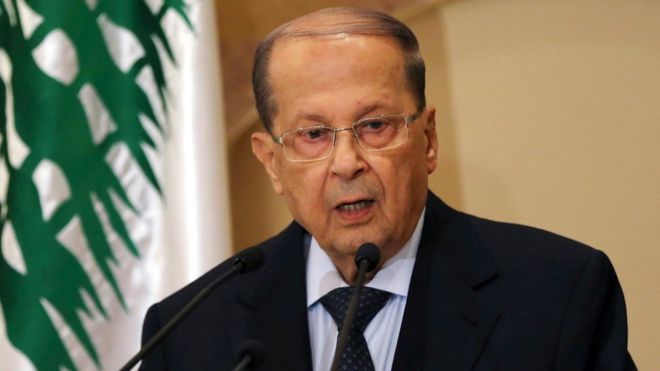President Michel Aoun said on Tuesday Lebanon faced a catastrophe if protesters did not go home, igniting a new wave of demonstrations during which a protester was shot and killed after an altercation with Lebanese soldiers near Beirut.
The shooting in Khaldeh south of Beirut was the first of its kind in nearly four weeks of nationwide protests against Lebanon’s ruling elite, escalating tensions in a country mired in deep political and economic crisis.
The man who was killed was a member of the political party led by Druze leader Walid Jumblatt, a civil war adversary of Aoun. Jumblatt urged his supporters to remain calm during a visit to the hospital where the man had been taken.
In a statement, the army said a soldier had opened fire to disperse protesters who were blocking a road in Khaldeh, wounding one person. The soldier was detained and the incident was under investigation.
Tensions flared in Beirut late into the night. In the Cola district near Beirut, dozens of men pelted stones at soldiers and a tank.
Already grappling with the worst economic crisis since the 1975-90 civil war, Lebanon has been plunged deeper into turmoil since the protests erupted on Oct. 17.
In a prime time televised interview, Aoun indicated there was no breakthrough in talks over forming a new government to replace Saad al-Hariri’s coalition cabinet. Hariri, who quit on Oct. 29, was hesitant about being prime minister again, he said.
Aoun also said a purely technocratic government, as demanded by many protesters, would not be able to govern Lebanon and so it should include politicians.
Addressing protesters in his interview, he said, “If you continue in this way, you will strike Lebanon and your interests.”
“We are working day and night to get the situation in order. If they keep going, there is a catastrophe. If they stop, there is still room for (us) to fix things,” he said.
As Aoun’s interview was ending, protesters blocked several main roads across Lebanon, some with burning tyres.
Linda Boulos Mikari, protesting on a road north of Beirut, said Aoun’s interview had brought her back onto the street.
“We are tired of the authorities always (acting) as if we are doing nothing. The president goes live and talks to us as if we are children, ‘go home’. Respect us a little,” she said.
